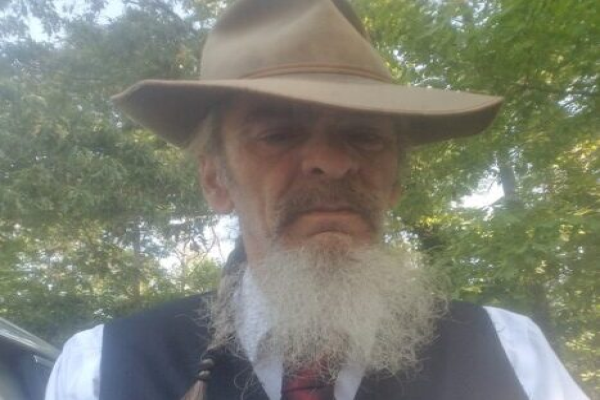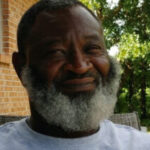Her roses were blooming when we said goodbye to my mother-in-law the other day.
I don’t know all the varieties she had growing in front of what was her home. I know Faye Hill loved her roses, and her husband Ralph dutifully planted them where she wanted as long as he was able.
Aunt Faye was possibly one of the last of her kind; the first time I met her, she wanted to feed me. Rhonda and I were courting, and we were in a hurry, since it was technically our first date. I was skinnier then than now, but rawboned skinny, not starvation skinny, more like a hound in fighting trim at the height of hunting season. I tried to defer the offer of lunch, since we were in a hurry, but she wasn’t hearing it. I had to eat a plate of fried chicken.
In every house she made a home, in every town where Ralph was called to be a pastor, all the way to the home of their last years (the one she loved the most) Aunt Faye tried to feed me and just about anybody else that wandered through the door. Whenever they moved, Aunt Faye hung pictures and had a spare bedroom and cooked chicken (both fried and with pastry) and almost got her feelings hurt if a visitor wasn’t hungry.
She knew the value of a good meal, having grown up on a tobacco farm in the years before much mechanization, when there were plenty of sharecroppers but no migrant labor. Girls were expected to pull their weight the same as boys, so she and her sisters did just that. It made folks tough.
Aunt Faye was feminine, but she and her sisters were tough as well. A family story described how one of her sisters was in a fight at school, and a mutual friend came running up asking if Faye was going to go help her sister.
“How many of them are there?” Faye asked. When the reply was “two or three.” Faye shrugged.
“She can handle them.” And sure enough, she did.
I’ve never been able to confirm or deny Faye’s own battle record, but I do know she wasn’t as prone to scrappin’ as her sisters. Still, I bet she could have handled two or three on her own in the right time and place. It wasn’t that she wanted to, or sought trouble, but she could take care of business if she had to do so.
That tougher side softened slightly when she met and married the son of another farmer, a man who was learning to be an electrician but would instead be called to the ministry. She and Ralph loved each other, deeply. Rhonda told me how her mama would sing Donna Fargo’s “Happiest Girl in the Whole USA,” and I think Faye Hill meant it with all her heart.
Even when she no longer had to be ready for a fist fight or to crop twenty rows of the golden leaf, she was still tough and strong, since being a pastor’s wife can be the hardest fight any woman could ever face.
Being the wife of a new, young pastor (later with two children) meant she sometimes had to work outside the home. At one point she even worked in a school cafeteria. Dreary, institutionalized labor as that must have been, I bet she was happy in her heart because she got to feed hundreds of children a day.
I often think all her dreams came true when my brother-in-law was a teenager playing football, bringing a gaggle of hungry boys home with him on a regular basis. It didn’t matter who they were, when they’d last eaten, or if they were heading home for supper. Aunt Faye would be sure no one left her home hungry.
I happened to be there one evening when a young man’s car broke down right at supper time, almost in the front yard of the parsonage. Uncle Ralph immediately jumped up from the table to assist the rather shaken fellow, and Faye made him a plate.
At Christmas, Thanksgiving and family dinners, she tried to make sure everyone had some of what they liked best. If you were blessed enough to be near her on your birthday, there was a better than average chance that as long as she could physically do so, your favorite meal and dessert would be on the table. I would not have been surprised had there been a fistfight at the big family Thanksgiving because someone hogged the chicken and pastry.
Hers was not a watery, soupy mess of chicken and pasta but was instead a thick, hearty meal of perfectly rolled biscuit dough with chunks of chicken big enough for a sandwich, “pastry” meant to sustain a man working in the field, satisfy a hungry young’un, or impress a visiting preacher on Sunday. The leftover chicken was stripped off the bones (since nothing could be wasted) and went into her chicken salad, which was also worthy of combat.
I never knew why, but there was something about the lady’s skill with a chicken that belied explanation. I honestly think she was sadder than the rest of us when she no longer made her signature dishes, since it was just too painful for her to stand up for too long.
Aunt Faye starting sliding into poor health around the time Uncle Ralph’s health was plummeting. She told their preacher that she had to get better so she could take care of her husband of 63 years. Even when they fussed, you could see and hear the love through the exasperation in their voices.
She was about love; when my parents passed, Aunt Faye went out of her way to remindmy brother Michael and me that she loved us, and to fill in some of the gaps left from our loss. She wanted to nurture our hearts as well as feed us.
Her house was always a home, whether it was a parsonage in Hampstead or Fair Bluff or Keener or Bolivia or her final home, the one she actually owned and called her own, a few miles down the road from the tobacco markets where her daddy once sold the product raised by their family. We always referred to it as “Rhonda’s mama and daddy’s house,” but it was truly a home.
It was where we met Ralph Jr.’s beautiful wife Callie, when she was only a few years older than Faye was when she married Ralph Sr. It was the place we gathered after funerals of folks both beloved and barely-remembered. It was where we watched Ralph and Callie’s girls, Emory and Cara, grow from squealing little girls with new Barbie dolls at Christmas to poised young ladies. It was where the cousins knew they could go when they were having a bad time and needed an ear, or where they could at least get a sandwich and catch up on family news.
It was Rhonda’s mama and daddy’s house, yes, but it was Faye’s home.
Ralph Jr. and his family met Rhonda, my brother Michael and myself back at Faye’s home after the memorial service Sunday evening. I honestly hadn’t been in a place so empty since we left my mama’s house, Miss Lois’ home, more than 20 years ago in Clinton. She too grew up hardworking and tough, and didn’t have a house of her absolute very own until her later years, but she made it a home for all her family.
But just like Miss Lois’ house, Aunt Faye’s passing meant her home was empty.
Sure, there were lots of memories and physical stuff — but it wasn’t a home anymore. The spirit of the home, if you will, was gone. Her roses, which Ralph planted and she nurtured, were just pretty roses. It was just another house, nice if you like that style, in a desirable little neighborhood, like all the others in a dozen similar subdivisions.
It can be someone else’s home now, and I hope they have twice the smiles and not even a quarter of the tears.
Shoot, it might even become a place where another lady makes sure her family always has a place to call home, where someone else can be the happiest girl in the whole USA.







